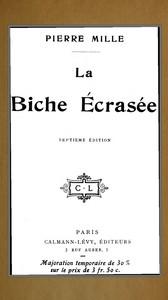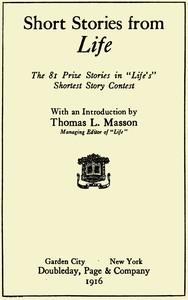|
|
Read this ebook for free! No credit card needed, absolutely nothing to pay.Words: 53569 in 22 pages
This is an ebook sharing website. You can read the uploaded ebooks for free here. No credit cards needed, nothing to pay. If you want to own a digital copy of the ebook, or want to read offline with your favorite ebook-reader, then you can choose to buy and download the ebook.

: La biche écrasée by Mille Pierre - Short stories French; French fiction 20th century@FreeBooksThu 08 Jun, 2023 UNITY BETWEEN CHRISTIAN DENOMINATIONS UNITY BETWEEN CLASSES UNITY IN THE EMPIRE UNITY BETWEEN NATIONS UNITY BETWEEN CHRISTIAN DENOMINATIONS But we are also all of us aware that the divisions among Christians are often severely commented on by those who refuse to make any definite profession of the Christian Religion, and are given by them sometimes as a ground of their own position of aloofness. It is true that strictures passed on the Christian Religion and its professors for failures in this, as well as in other respects, frequently shew little discernment, and are more or less unjust. So far as they are made to reflect on Christianity itself, allowance is not made for the nature of the human material upon which and with which the Christian Faith and Divine Grace have to work. And when Christians of the present day are treated as if they were to blame for them, sufficient account is not taken of the long and complex history, and the working of motives, partly good as well as bad, through which Christendom has been brought to its present divided condition. Still we cannot afford to disregard the hindrance to the progress of the Christian Faith and Christian Life among men created by the existing divisions among Christians. Harm is caused by them in another way of which we may be, perhaps, less conscious. They bring loss to ourselves individually within the denominations to which we severally belong. We should gain incalculably from the strengthening of our faith through a wider fellowship with those who share it, the greater volume of evidence for the reality of spiritual things which would thus be brought before us; and from the enrichment of our spiritual knowledge and life through closer acquaintance with a variety of types of Christian character and experience; and not least from that moral training which is to be obtained through common action, in proportion to the effort that has to be made in order to understand the point of view of others, and the suppression of mere egoism that is involved. These are strong reasons for aiming at Christian unity. But further there comes to all of us at this time a powerful incentive to reflection on the subject, and to such endeavours to further it as we can make, in the signs of a movement towards it, the greater prominence which the subject has assumed in the thought of Christians, the evidence of more fervent aspirations after it, the clearer recognition of the injury caused by divisions. I remember that some 40 or more years ago, one of the most eminent and justly esteemed preachers of the day defended the existence of many denominations among Christians on the ground that through their competition a larger amount of work for the advance of the kingdom of God is accomplished. We are not so much in love with competition and its effects in any sphere now. And it should always have been perceived that, whatever its rightful place in the economic sphere might be, it had none in the promotion of purely moral and spiritual ends. The preacher to whom I have alluded did not stand alone in his view, though perhaps it was not often so frankly expressed. But at least acquiescence in the existence of separated bodies of Christians, as a thing inevitable, was commoner than it is now. In the new attitude to this question of the duty of unity that has appeared amongst us there lies an opportunity which we must beware of neglecting. It is a movement of the Spirit to which it behoves us to respond energetically, or it will subside. Shakespeare had no doubt a different kind of human enterprises mainly in view when he wrote: There is a tide in the affairs of men, Which taken at the flood, leads on to fortune; Omitted, all the voyage of their life Is bound in shallows and in miseries. But this observation is broadly true of all human progress. An advance of some kind in the relations of men to one another, or the remedying of some abuse, begins to be urged here and there, and for a time those who urge it are but little listened to. Then almost suddenly the minds of many, one hardly knows why, become occupied with it. If in the generation when that happens desire leads to concentrated effort, the good of which men have been granted the vision in their minds and souls will be attained. Otherwise interest in it will pass away, and the hope of securing it, at least for a long time, will be lost. A few years later a far more serious difference arises. Jewish believers in Jesus had continued to observe the Mosaic Law. When converts from among the Gentiles began to come in the question presented itself, "Is observance of that Law to be required of them?" Only on condition that it was would many among the Jewish believers associate with them. In their eyes still all men who did not conform to the chief precepts of this Law were unclean. It is possible that there were Jews of liberal tendencies, men who had long lived among Gentiles, to whom this difficulty may have seemed capable of settlement by some compromise. But in the case of most Jews, not merely in Palestine, but probably also in the Jewish settlements scattered through the Graeco-Roman world, religious scruples, ingrained through the instruction they had received and the habits they had formed from child-hood, were deeply offended by the very notion of joining in common meals with Gentiles, unless they had fulfilled the same conditions as full proselytes to Judaism, the so-called "proselytes of righteousness." On behalf, however, of Gentiles who had adopted the Faith of Christ, it was felt that the demand for the fulfilment of this condition of fellowship must be resisted at once and to the uttermost. So St Paul held. To concede it would have caused intolerable interference with Gentile liberty, and hindrance to the progress of the preaching of the Gospel and its acceptance in the world. And further--upon this consideration St Paul insisted above all--the requirement that Gentiles should keep the Jewish Law might be taken to imply, and would certainly encourage, an entirely mistaken view of what was morally and spiritually of chief importance; it would put the emphasis wrongly in regard to that which was essential in order that man might be in a right relation to God and in the way of salvation. Among the Jews the thought of the people in its relation to God was associated with great assemblies in the courts and precincts of the temple at Jerusalem, which altogether overshadowed any expression of their covenant relation to God as a people which they could find in their synagogue-worship, however greatly they valued the bonds with one another which were strengthened, and the spiritual help which they obtained, through their synagogues. But Christians had no single, central meeting-place for their common worship at which their ideal unity was embodied. It was, therefore, all the more natural that the exalted name which described that unity should be transferred to the communities in different places which shared the life, the privileges, and the responsibilities of the whole, and in many ways stood to those who composed them severally for the whole. The divisions between these communities were local only. They arose from the limitations to intercourse and common action which distance imposed. Or, in cases where the Church in some Christian's house is referred to, they were due to the necessity, or the great convenience, of meeting in small numbers, owing to the want of buildings for Christian worship, or the hostility of the surrounding population. Moreover these local bodies were not suffered to forget the ties which bound them all together. Those in the Greek-speaking world were required to send alms to the Churches in Judaea. Again an individual Church was not free to disregard the judgment of the rest. After St Paul has reasoned with the Corinthians on the subject of a practice which he deemed inexpedient, he clinches the matter by declaring, "we have no such custom neither the Churches of God." Lastly, the Apostles, and preeminently St Paul, through their mission which, if not world-wide, at least extended over large districts, and the care of the Churches which they exercised, and the authority which they claimed in the name of Christ, and which was conceded to them, were a unifying power. Free books android app tbrJar TBR JAR Read Free books online gutenberg More posts by @FreeBooks
: Short stories from Life: The 81 prize stories in Life's Shortest Story Contest by Masson Thomas L Author Of Introduction Etc - Short stories American; American fiction 20th century@FreeBooksThu 08 Jun, 2023

: Wild west by Sinclair Bertrand W - Western stories; Montana Fiction; Cattle stealing Fiction; Ranch life Fiction; Ranches Fiction@FreeBooksThu 08 Jun, 2023
|
Terms of Use Stock Market News! © gutenberg.org.in2025 All Rights reserved.






